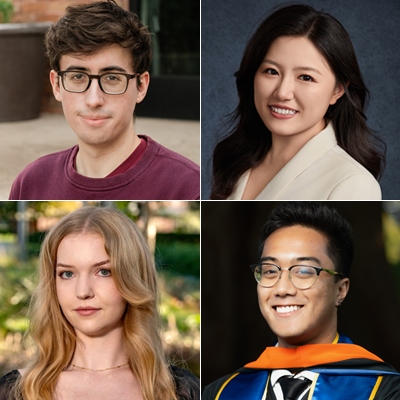Four Graduate Students Selected for Los Alamos National Lab Fellowship

The 2024-25 UCI-LANL-SoCalHub Graduate Research Fellows are, clockwise from top left, Arthur Feeney, Shu Li, Ezra Sarmiento and Anthea Segger.
Oct. 29, 2024 - The Samueli School of Engineering has selected four graduate students for the 2024-25 UCI-LANL-SoCalHub Research Fellowship. These fellowships support UCI engineering graduate students working in areas of common interest with the Los Alamos National Laboratory (LANL) and provide a mechanism to bridge research and training between the two institutions for future career paths and long-term collaboration.
The four UCI fellows will receive co-mentorship from an engineering professor and a LANL scientist. They have the opportunity to spend time at LANL and use its unique facilities and expertise for their research and training. Here are this year’s fellows:
Arthur Feeney, Department of Electrical Engineering and Computer Science
Mentors: Aparna Chandramowlishwaran, UCI; Ying Wai Li, LANL
Feeney’s research will have two focus areas. The first will explore the application of machine learning-based methods to materials generation and discovery. The goal is to be able to quickly generate new materials that have desirable properties. The second focus will be on improving the performance of scientific machine learning codes, which can be prohibitively slow — sometimes requiring dozens of hours to train a single model. The combination of these areas will be a step toward faster and cheaper computational methods for materials discovery. Feeney says the fellowship will be a great opportunity for him to use LANL’s large computing resources as well as build new collaborations and learn from scientific computing experts.
Shu Li, Department of Civil and Environmental Engineering
Mentors: Tirtha Banerjee, UCI; Sanna Sevanto, LANL
Li’s project focuses on understanding the real-time variations in fuel moisture content in forest fuels which can help researchers better understand the behavior of wildfires. She aims to link water potential, a key indicator of plant water stress, to fuel moisture by studying the water transport processes in the soil-plant-atmosphere system. The research will incorporate field measurements and satellite data to analyze how climatic factors affect fuel moisture across different fuel types. By integrating these findings into ensemble deep learning models, the team will provide high-resolution and real-time fuel moisture estimates, improving fire behavior models. “I’m looking forward to seeing how our research can help fire management teams respond more effectively during wildfire seasons, ultimately leading to safer environments for people and ecosystems,” said Li.
Ezra Sarmiento, Department of Materials Science and Engineering
Mentors: David Kisailus, UCI; Kyungtae Kim, LANL
Sarmiento is investigating the biomineralization pathways found in mollusks for the development of new bioinspired crystal nucleation and growth mechanisms for next-generation advanced materials, such as structured oxide battery materials. Specifically, he is working with the abrasion resistant metal teeth of the Chiton, as it provides spatial and temporal snapshots into these biological processes. Sarmiento looks forward to the mentorship of Kyungtae Kim and the expertise he provides as well as the resources at the Center for Integrated Nanotechnologies at LANL. “I’m excited for this fellowship because it will let me dive deeper into the intricacies of my system while also providing me the resources to develop advanced bio-inspired applications with my research,” said Sarmiento. “Who knows? Maybe one day I’ll end up at LANL mentoring someone else in the future.”
Anthea Segger, Department of Materials Science and Engineering
Mentors: Stacy Copp, UCI; Ryan Duncan, LANL
Segger will use a DNA-stabilized silver nanocluster platform to experimentally test computational predictions that silver nanocluster systems can exhibit enhanced energy transfer efficiency. This research will advance the science of nanocluster near-field interactions, which have previously been challenging to investigate. DNA ligands provide the unique capability of sequence-programmed nanoscale assembly to overcome these challenges. She will explore the dependence of resonance energy transfer efficiency on both the separation distance and relative orientation of atomically precise silver nanocluster pairs. These findings will be relevant far beyond the DNA-stabilized silver nanocluster system and will advance general engineering principles for building advanced photonic platforms from nanocluster-based materials. Segger is looking forward to working with LANL scientist Duncan Ryan. “He is highly experienced in measuring energy transfer in nanoscale systems, and his guidance will be invaluable both for my work and to accelerate my personal growth as a researcher.”
The fellowships are part of a collaborative partnership between the UCI school of engineering and Los Alamos. The SoCalHub is a program led by the UCI Office of the Vice Chancellor for Research and funded by the UC Office of the President to increase connections between the five south UC campuses and the UC-managed national laboratories.
– Lori Brandt
